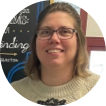Year 1, 2, and 3 Cheat Sheet
Tips and tricks from our YEA Council on what to focus on in the first three years of teaching:
Year One Goals
- Survive. All the extra things can wait
- Build relationships
- Work life balance, get enough sleep!
Year Two Goals
- Refine classroom management
- Build curriculum that can be used and adapted again and again
- Know your standards, don’t reinvent the wheel
Year Three Goals
- Understanding your teaching style
- Build and branch — take what you’ve done and branch into new styles
- Reflect on what’s working and what’s not
- Celebrate how far you’ve come!
Answers To Your Questions
Am I doing this right? How can I have confidence in what I am teaching?
What are ways that I can meaningfully engage with parents? How to handle tough conversations with parents?
Here is a great step-by-step resources on tough conversations with parents. Don’t be afraid to ask for support from other teachers or administrators.
How can I keep student engagement up throughout the day? Throughout the year?
We all know student engagement is key to successful learning, but how can teachers make that happen? Check out this list of perspectives from veteran teachers on how to keep your classroom engaged.
How can I know if I am staying at work too late? What are ways that I can balance my personal and professional life?
There is no perfect balance out there (see Year 1 recommendations on getting enough sleep!), but it is important to prioritize your own self-care and well-being in order to fully show up for your students. Check out these ideas for teachers to manage stress and fill up your cup.
Where can I find grants?
Check out your local community foundation or school foundation
Ask your administration or leadership team
Google has many compilations of grants, including this one!
Check out Alumni pages
Principal, Facebook, Email
Sign up for grant workshops
Check out place-based grant resources from Rural Schools Collaborative
How can I get support and reduce isolation?
Get involved in the community.
- Ask for help:
Be the squeaky wheel - lean on your veteran teachers, administrators, community members, friends, family, etc.!
Ask for resources or support in I Am A Rural Teacher Facebook Group
- Hear from other rural teachers:
You’d be surprised how many folks have gone through the same thing. Isolation? Yep. Imposter syndrome? Yep. We are here for you, and RSC has an archive of many years of these stories.
How do I connect curriculum to real life? The community? How can I initiate collaboration?
Place-based education is the perfect place to start! Check out these incredible Place-based resources from our partners at Teton Science Schools. Inviting the community into your classroom, and getting your class out into the community is a huge step in young people becoming invested in where they live.
How do I create and manage my classroom budget? How do I find extra resources for my class?
Rural educators are often asked to do much with very little, and many times that means paying out of pocket for extra supplies to ensure their students have the very best available to them. Learning how to create and manage a classroom budget, or find extra resources, can be daunting, but here's some ideas to help get you started:
A Guide to Making and Stretching Your Classroom Budget by PraxisExam.org
Reach out to your local community foundation, community fund, family foundation, or school foundation as well. These place-based philanthropic organizations often seek to invest in a thriving future for the local community, and strong rural schools are central to that mission!
Join the Conversation!
Our goal for the Resiliency Guide is to be a source of continued conversation, collaboration, and support for new rural teachers. We want to hear from you!
Share a Resource
What did we miss? Have an idea? Send us an email at info@ruralschoolscollaborative.org!
Engage
- Sign up for our newsletter
- Post or find a rural teaching job
- Read more rural teacher perspectives
- Join the I Am A Rural Teacher Facebook group
Tell Your Story
Calling all rural teachers, and rural education advocates - join the digital community on this platform and share your story! Fill out this easy form to get in touch.


